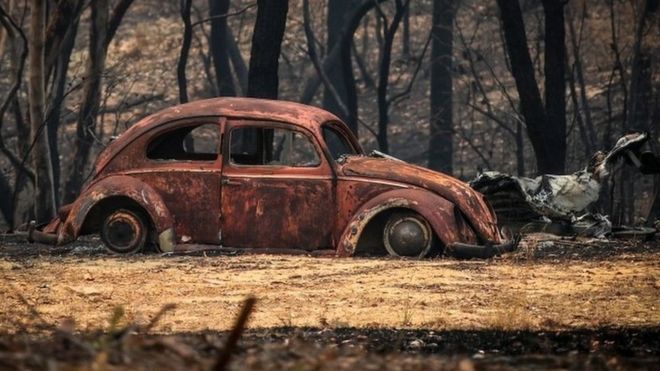moon
Satire for Sanity
Record low rainfall has contributed to a continent-scale emergency that has burned through more than 5m hectares and alarmed scientists, doctors and firefighters

As the area burned across Australia this fire season pushes beyond five million hectares, an area larger than many countries, stories of destruction have become depressingly familiar.
At the time of writing, nine people have been killed. Balmoral, in the New South Wales southern highlands, is the latest community affected in a state where up to 1,000 homes have been destroyed. A third of the vineyard area and dozens of homes were razed in the Adelaide Hills. It is too early for a thorough examination of the impact on wildlife, including the many threatened species in the fires’ path.
Who says the bushfires are unprecedented?
The firefighting agency in the state worst affected, for starters.
The NSW Rural Fire Service says the scale of what has burned in that state is unprecedented at this point of the fire season. By Monday, 3.41 million hectares had burned. “To put it in perspective, in the past few years we have had a total area burned for the whole season of about 280,000 hectares,” RFS spokeswoman Angela Burford said.
What do scientists say?
David Bowman, director of The Fire Centre at the University of Tasmania, says the most striking thing about this fire season is the continent-scale nature of the threat. The damage in each state is explained here.
To deal with these sort of fires the first step is to acknowledge the scale of the problem
David Bowman
“The geographic range, and the fact it is occurring all at once, is what makes it unprecedented,” Bowman says. “There has never been a situation where there has been a fire from southern Queensland, right through NSW, into Gippsland, in the Adelaide Hills, near Perth and on the east coast of Tasmania.”
He says one of the less explored issues, though it has begun to receive some attention in recent days, is the economic impact of having prolonged fires that affect so many Australians.
“You can’t properly run an economy when you get a third to a half of the population affected by smoke, and the media completely focused on fires,” he says. “I’m not quite certain why anybody would want to be claiming fires have been like this before. It’s concerning as it is a barrier to adaptation. To deal with these sort of fires the first step is to acknowledge the scale of the problem.”
Ross Bradstock, from the University of Wollongong’s Centre for Environmental Risk Management of Bushfires, points to the Gospers Mountain fire, which started in a lightning strike north-west of Sydney in late October and has now burned about 500,000 hectares, as evidence of how this season differs from what has come before.
The fire has now combined with others on the NSW Central Coast to create a mega-blaze, but Bradstock says it was almost certainly the largest single ignition-point forest fire recorded in Australia and, for mid-latitude forests, possibly the world. He says it is bigger than any in California and Mediterranean Europe. A large fire in those conditions is usually about 100,000 hectares.
https://www.theguardian.com/austral...lias-monster-2019-bushfires-are-unprecedented
maggot- stfu- and fuck off.




